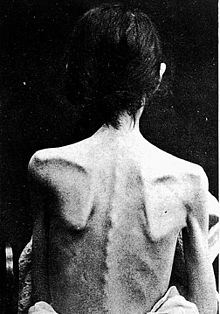Anorexia nervosa
Anorexia nervosa (usually just called anorexia) is an eating disorder.


People with anorexia think that they are fat, or desperately fear becoming fat even if they are very skinny. It is also a mental disorder. To try to lose weight, anorexics do not eat enough. When they do eat, they do not eat the amount of food their body needs, in an effort to avoid gaining weight. This causes them to lose too much weight too quickly. This is very harmful to a person's body. There are various treatments for anorexia. One example is the Maudsley Method. This type of treatment is for patients who are 18 or younger. Two thirds of adolescent anorexia patients are 'recovered' at the end of this treatment. People with anorexia are more likely to die than people with any other mental illness.
Diagnosis
changeDoctors use the Diagnostic and Statistical Manual of Mental Disorders to make a medical diagnosis and decide if a person has anorexia or not. Four signs of anorexia are listed in the manual. People do not have to show all four signs for the doctor to decide that they have anorexia.
- Signs of anorexia
- People with anorexia do not want to keep a body weight and BMI that is normal for their age and height.
- People with anorexia think that they are overweight. They are afraid of gaining more.
- People with anorexia have low self-esteem because of the shape or weight of their body. However, they do not think that low body weight is a problem.
- A woman with anorexia might not have their period multiple months in a row (one period is sometimes called a menstrual cycle). They also must make sure the woman is not pregnant and has not had their periods stop permanently due to their age, which is called menopause.
Symptoms of anorexia
change- Fear of gaining weight
- Having a distorted self-image
- Changes in eating habits or routines
- Compulsive exercising
- Counting calories
- Skipping meals
- Feeling cold all the time
- Absent periods [1]
Dangers of anorexia
change- Total self-starvation
- Heart attack or heart failure
- Kidney failure[2]
- Electrolyte imbalance
- Muscle and organ damage (when the body has no fat to live off of, it begins to digest muscle and tissue)
- Suicide[3]
Causes
changeThere is no single cause of anorexia. Researchers believe that it is caused by a combination of biological and environmental factors. It has been linked to media. Many people think that anorexia is caused by wanting to be thin like models in magazines. However, it is not that simple.
People who develop anorexia tend to be perfectionistic. They are also more likely to have problems socializing.[2] There has been research about the link between anorexia and autism spectrum disorder (ASD), a disorder that involves problems with socializing. Another symptom of autism spectrum disorder is OCD, which has also been linked to anorexia.[3] Starvation is known to create antisocial behavior so there needs to be research that compares those traits in anorexics with people who have recovered.
Consequences
changeAnorexia can lead to health problems caused by undernutrition and low body weight such as low blood pressure, slow or irregular heartbeats, tiredness, constipation, irregular period, weak bones. People with anorexia may find it hard to focus. Mood changes and emotional problems include feeling sad or depressed, anxiety and fear about gaining weight or thoughts of self harm.[4]
Risk groups
change- Adolescents
- Women - during key transition periods, for example pregnancy and menopause
- Athletes - body shape may be affecting performance
- People with a family history of eating disorders[5]
Treatment
changeTreatment includes consultation with a nutritional therapist, stabilizing weight loss, psychotherapy, which includes practical techniques for developing healthy attitudes toward food and weight and hospitalization. It might be necessary to treat severe weight loss that has resulted in malnutrition and other serious mental or physical health complications, for instance heart disorders, depression, low blood pressure or kidney problems. [6]
Prevention
changeTo develop healthy eating habits and lifestyle behaviors, it’s important to follow a balanced diet that includes whole grains, fruits, vegetables, and lean proteins. Limiting the intake of salt, sugar, and alcohol is also essential for general health. Extreme dieting should be avoided; if weight loss is a goal, it’s advisable to consult a nutritional therapist to create a personalized plan. Using laxatives for weight loss is not recommended, as it can destroy the digestive system. Regular physical activity, such as at least 150 minutes of moderate exercise per week, should be incorporated into daily routines. Promoting a healthy body image involves focusing on how the body feels and functions, rather than just its appearance.[7]
Famous people with anorexia
change- Victoria, Crown Princess of Sweden
- Elisabeth of Bavaria
- Angelina Jolie
- Lucy Hale
- Taylor Swift
- Amy Winehouse
- Zayn Malik
- Eugenia Cooney
- Emma Chamberlain
- Lily-Rose Melody Depp[8]
References
change- ↑ "Anorexia Nervosa". Cleveland Clinic. Retrieved 2025-01-06.
{{cite web}}:|first=missing|last=(help) - ↑ 2.0 2.1 Zucker, Nancy L.; Losh, Molly; Bulik, Cynthia M.; LaBar, Kevin S.; Piven, Joseph; Pelphrey, Kevin A. (November 2007). "Anorexia nervosa and autism spectrum disorders: Guided investigation of social cognitive endophenotypes". Psychological Bulletin. 133 (6): 976–1006. doi:10.1037/0033-2909.133.6.976. ISSN 1939-1455. PMID 17967091.
- ↑ 3.0 3.1 "APA PsycNet". psycnet.apa.org. Retrieved 2023-02-10.
- ↑ "Eating disorders (For teens)". Nemours. TeensHealth. Retrieved 2024-12-16.
- ↑ "Identifying people at risk of eating disorders". National Eating Disorders Collaboration. Retrieved 2024-12-16.
- ↑ "Anorexia Nervosa". Cleveland Clinic. Retrieved 2024-12-09.
- ↑ "Eating disorders". Mayo Clinic. Retrieved 2025-01-06.
- ↑ "List of people with anorexia nervosa". Wikipedia. Retrieved 2025-01-06.